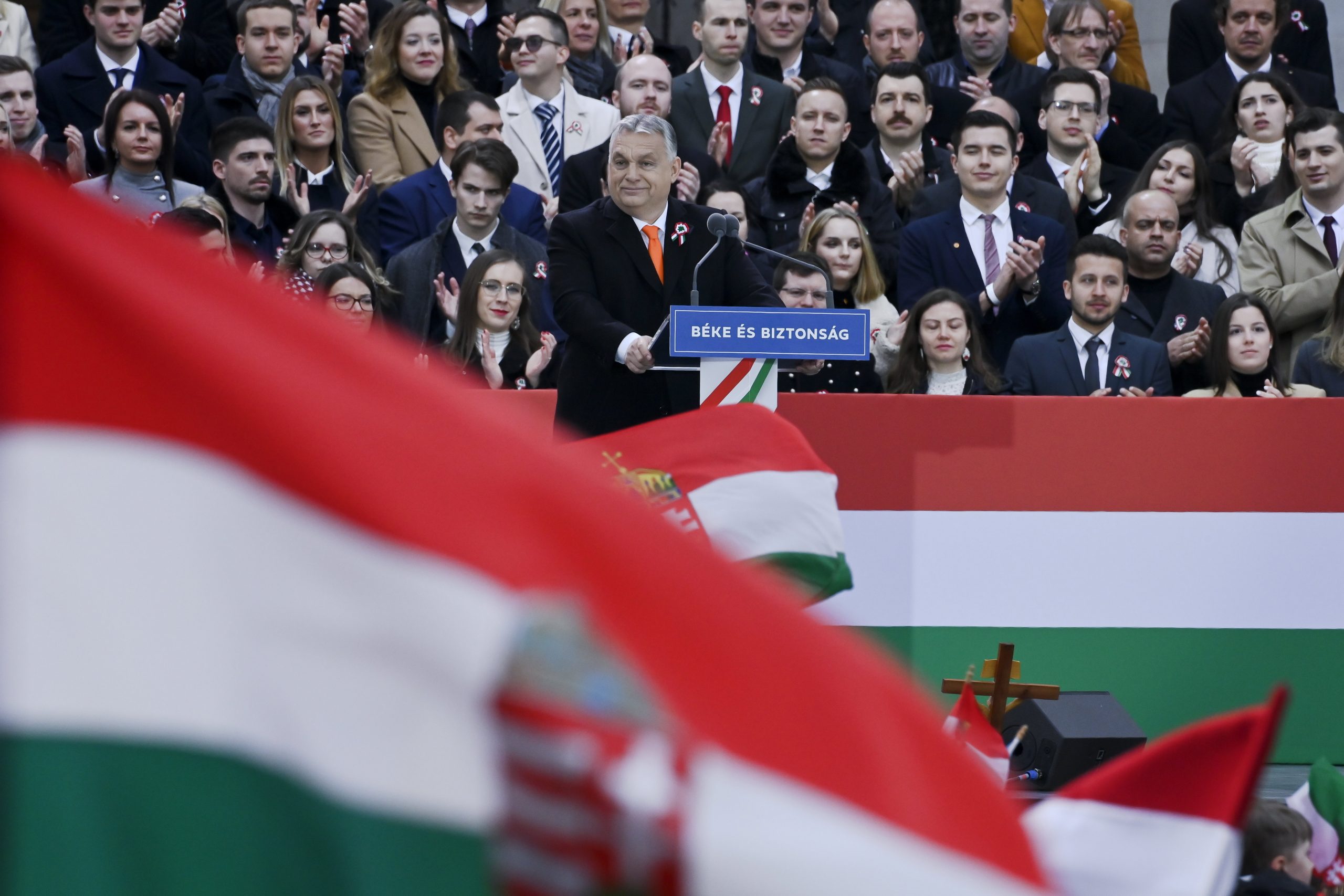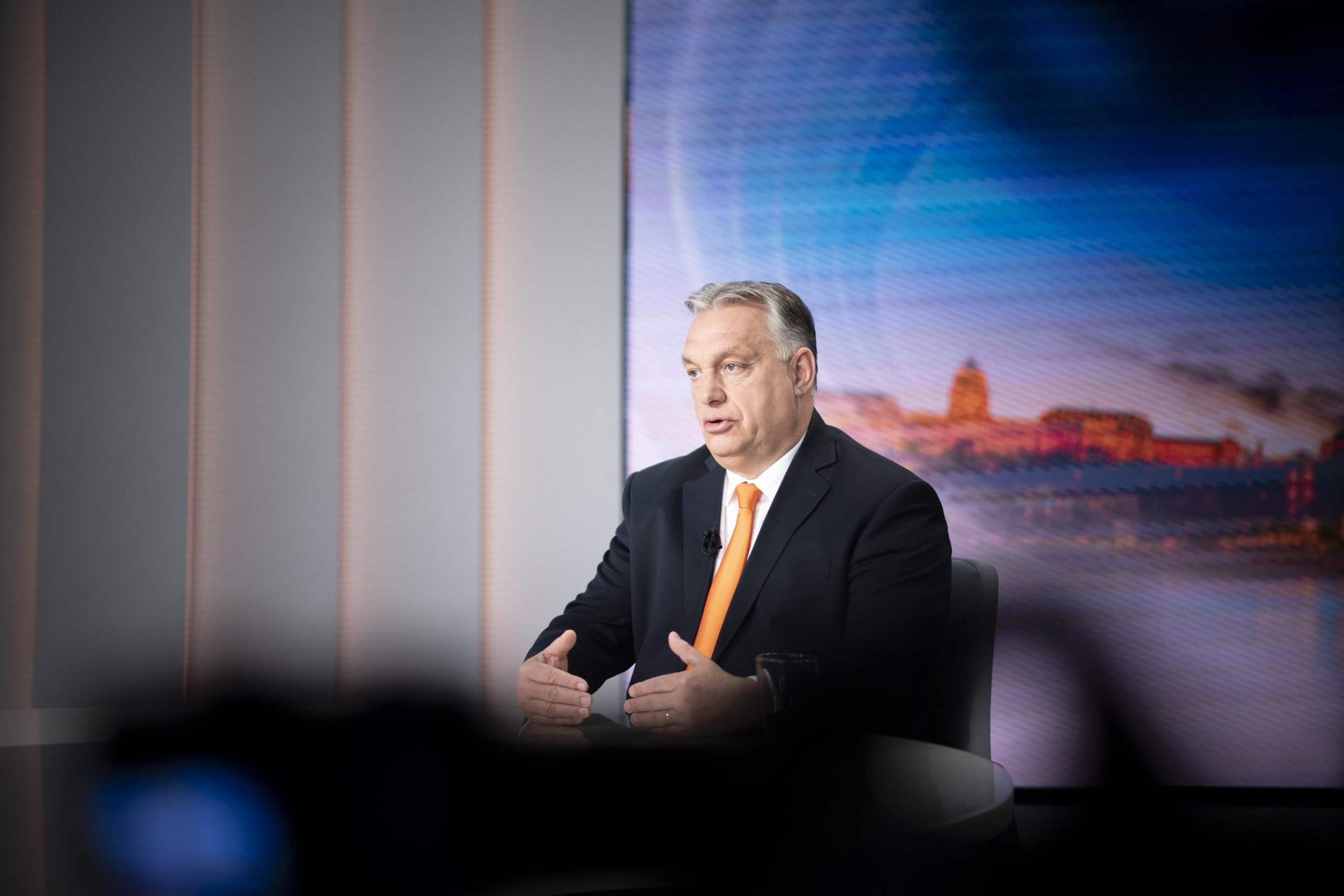
The war has "raised the stakes" of the election "to the skies", Viktor Orbán said, adding that it is in Hungary's interest not to be a pawn in the chess game of great powers.Continue reading

Hungary’s nationally minded political camp has made it clear that “we stand on the side of peace and Hungary cannot be dragged into the war,” Prime Minister Viktor Orbán told commercial news channel HírTV on Monday.
“The nationally minded camp in Hungary says that this is a Russian-Ukrainian war, and we’re Hungarians; we help those in need but at the same time we won’t take a single step that would get Hungary into trouble,” the prime minister said of the war. “We can’t help anyone by ruining ourselves.”
“If we get drawn into the war, which isn’t our war, we’ll have nothing to gain but everything to lose,” Orbán said. Hungary’s nationally minded political camp says that “we’ll stay on the side of peace, we won’t ship weapons, we won’t send soldiers and we won’t allow the transit of weapons across Hungary’s territory into Ukraine,” Orbán said in the interview.
Orbán said the left-wing had made it clear that they did not see the war as a conflict between two peoples but rather as one that “they, too, are directly connected to; and they think the right thing to do would be to have Hungary get involved in the conflict”. Meanwhile, NATO says that all of its member states are independent and the national governments will decide what they should do, he said. “The question is whether there is anything we will do together, and the answer to that is that there will be no such operation; NATO won’t send troops or weapons.”
Orbán said this stance did not mean that there were no disagreements within NATO, and that there were some in the alliance “who, going against the Hungarian position, want to push NATO into this conflict”. The Hungarian left-wing, he added, wanted to please the countries that favored pushing NATO into the conflict.
The situation is difficult and risky, the prime minister said. Orbán said the risk of war was at stake in this Sunday’s general election, arguing that if the opposition won, there would be another NATO country that wanted to “push NATO and Hungary into this conflict”. “So if we want peace, that can only be represented by the nationally minded side both in Hungary and within NATO,” he said.
When you’re a teenager and you’re reading Western novels, you’re constantly reading them as being with somebody: white people or Indians. But politics is not this world. Politics, therefore, is only for grown-up persons with mature mind, who do not identify with one or the other of the actors in the conflict, but first of all clarify who we are and our relationship to this conflict. So this is not an adventure novel, it is a bloody one. People die, countries are blown apart, economies collapse. So we must not put ourselves in the place of one of the characters, but we must make it clear that this is Hungary, we are Hungarians, we have clear interests, we have responsibilities, and we must always help those in need, and we will do our utmost to help.”
Hungary, Orbán said, was “punching above its weight” when it came to helping, arguing that the country was taking in more refugees and caring for more people relative to its population than any other European country. “So we’re not a lousy but rather a great nation which is also doing the right thing morally,” Orbán said.
“But we can’t help the Ukrainians by getting Hungary blown apart,” he said. “Turning off the Russian oil and gas taps and bringing the Hungarian economy to a halt isn’t help.”
Hungary’s interest lies in peace, as do that of the Ukrainians and the Russians, Orbán said. The country must also preserve its security not just from a military perspective but also an economic one, he added. If Hungary’s energy supplies were cut off the economy would grind to a halt, Orbán said, adding that this was why he was fighting the European position that favors extending the sanctions on Russia to oil and gas supplies.
Orbán said plans were for nuclear power and solar energy to cover more than 90 percent of energy demand over the next decade. Some sources of energy would still come from Russia, he added, but the aim was not to depend on it or to be vulnerable to it.
Referring to grain production from Russia and Ukraine, he noted “a serious chance” that supplies from both countries would “drop out” and hunger would result.
Hungary, he suggested, was vulnerable to grain price rises if Hungarian produce were snapped up by foreigners at inflated prices, “and then we’d have to import at even higher prices”.
A long war may impact the European economy and certain food produce may not be available in sufficient quantities, he added.
The prime minister said the stakes were high. “At times like this calmness is required; calm and experience, and rising above daily political disputes.”
“This election is not a forgone conclusion; it’s an open fight,” he said, referring to the April 3 election. He urged voters to go to the polls and make sure that like-minded people did the same. “If we all turn out, we’ll get the result [we want] — but only if we do.”
In connection with the referendum on child protection held in parallel with the general election, Orbán mentioned “the gender insanity” in the West. He said Hungarians “know trouble is brewing”, and that is why turnout for the referendum “will be high”, he said.
The prime minister said that support for notions associated with the traditional family and lifestyles was “very high”, and on this issue, the normal left-right divide was basically irrelevant because the question was “whether we want to continue to arrange our lives normally or get into an adventure via our children on a matter that until now had been a point of certainty.” “The people have a definite opinion,” he said, adding that the only question was whether they would turn out and give their opinion with regard to the four referendum questions.
Featured photo by Vivien Cher Benko/PM’s Press Office